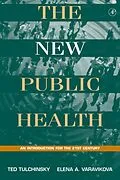Countries around the world are engaged in health reform, which places great demands on health care providers and systems managers. From the managed care revolution in the United States to the rebuilding of health systems in postcommunist Russia, these reforms impact millions of health care workers, government officials, patients, and the public alike. The New Public Health will help students and practitioners understand factors affecting the reform process of health care organization and delivery. It links the classic public health issues such as environmental sanitation, health education, and epidemiology with the new issues of universal health care, economics, and management of health systems for the new century. - Provides a comprehensive overview of public health from a global perspective - Assesses health systems models of the United States, Russia, the United Kingdom, Germany, Canada, Scandinavian countries, and developing countries including China, Nigeria, and Colombia - Analyzes critical issues of health economics, including forces associated with escalating costs and the strategies to control those costs - Discusses strategies for dealing with the many ramifications of managed care - Links medicine with the social sciences, technology, and health management issues as they evolve
Autorentext
Theodore H. Tulchinsky (MD from the University of Toronto; M.P.H. degree from Yale University) served as a Deputy Minister of Health and Social Development in the Province of Manitoba, Canada, Director of Public Health in the Ministry of Health in Israel, and Director of Preventive Health Services and Coordinator for Health and supervisor of health in the West Bank and Gaza (development of immunization, nutrition, primary care for maternal and child health especially). He is Associate Professor at the Braun School of Public Health at the Hebrew University, and was Fulbright Scholar and Visiting Professor at the University of California, Los Angeles (UCLA) School of Public Health. He has published extensively on public health topics including on infectious diseases, nutrition and environmental health. He is active in promoting new schools of public health in Countries of Eastern Europe, the former Soviet Union and Central Asia, served on the Executive Board of the European Association of Schools of Public Health. He is lead author on the textbook The New Public Health (three editions in 1999, 2005, 2014); NPH has been translated into Russian, Bulgarian, Macedonian, Moldovan, Romanian, Mongolian, Georgian and Turkish languages. Ted was awarded the Andija Stampar Medal in 2010 for "excellence in promoting public health education in Europe, and has been Deputy Editor of Public Health Reviews from 2010 to 2017.
Inhalt
Acknowledgements.
Foreword.
Introduction.
A History of Public Health.
Expanding the Concept of Public Health.
Measuring and Evaluating the Health of a Population.
Communicable Diseases.
Noncommunicable Conditions.
Family Health.
Special Community Health Needs.
Nutrition and Food Safety.
Environmental and Occupational Health.
Organization of Public Health Systems.
Measuring Costs: The Economics of Health.
Planning and Managing Health Systems.
National Health Systems.
Human Resources for Health Care.
Technology, Quality, Law, and Ethics.
Globalization of Health.
